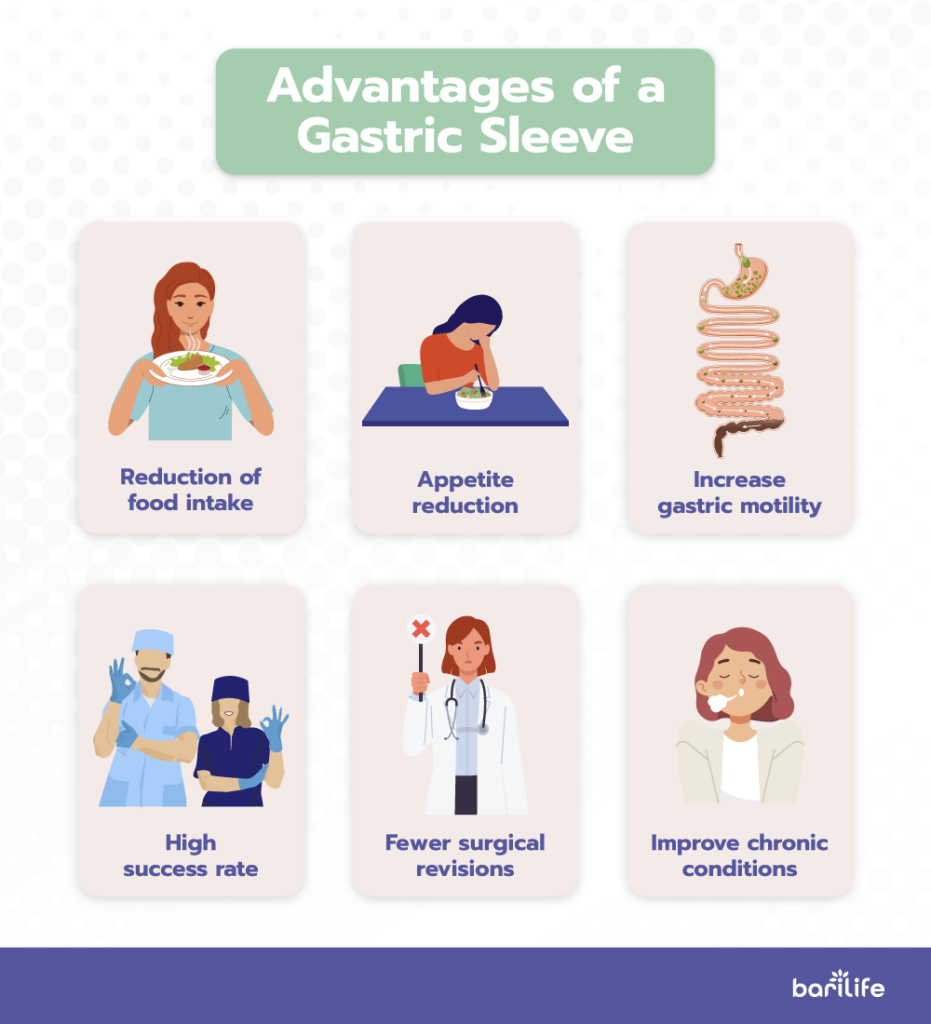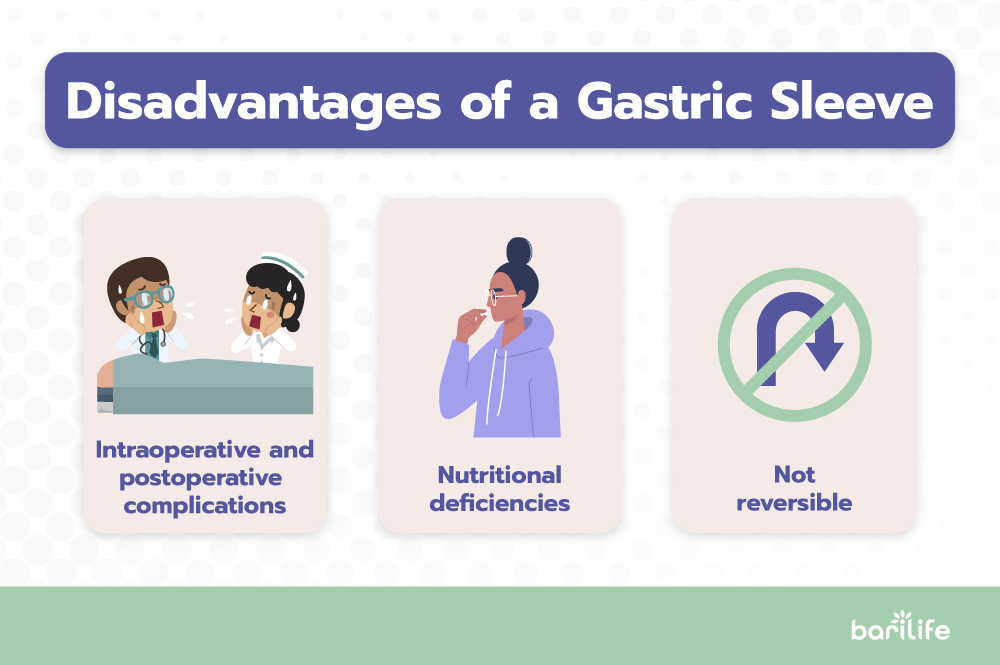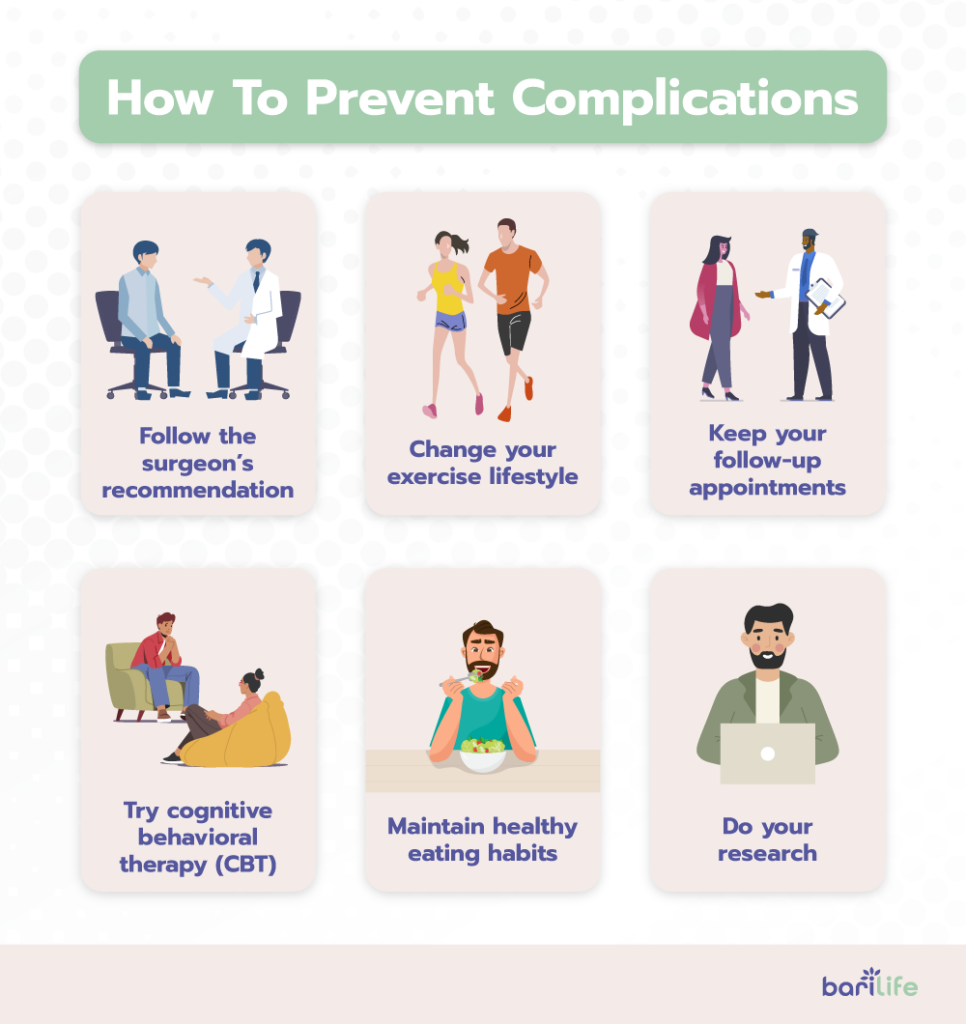About 200,000 people in the United States have bariatric weight loss surgery every year. This includes surgeries like the gastric sleeve, gastric band, roux-en-Y, and many more. With the most popular being the gastric sleeve procedure, or sleeve gastrectomy, due to its higher success rates than other bariatric procedures.
Before discussing whether a gastric sleeve is reversible or not, let’s review gastric sleeve surgery, and its advantages and disadvantages.
What is Gastric Sleeve Surgery
Gastric sleeve surgery is recommended treatment for people with a body mass index (BMI) greater than 40. Or it’s recommended for people with a BMI between 35 and 40 who have chronic health conditions. Some of the chronic health conditions that may qualify you are high blood pressure, type 2 diabetes, sleep apnea, or heart disease. If you have a high BMI, discuss your options for surgery with your doctor, because you may qualify.
Next, let’s review what happens during gastric sleeve surgery. During surgery, you are put to sleep using general anesthesia. Typically, your surgeon will complete laparoscopic surgery, where several small incisions are made in your abdomen. Your surgeon then removes approximately 80% of your stomach, leaving a narrow sleeve. After a portion of your stomach is removed, your surgeon will staple it up to ensure there is no leakage. Once they verify there is no leakage from your stomach and close your abdominal incisions, your surgery is complete.
Advantages of a Gastric Sleeve
Since the size of your stomach is significantly reduced, there are now several ways for you to achieve weight loss. There are other advantages of gastric sleeve surgery as well, besides just weight reduction.
- Reduction of food intake: First, by reducing the size of your stomach, you won’t be able to eat as much. So weight loss is first achieved by physically restricting food intake.
- Appetite reduction: Your body will experience hormonal changes in the stomach and intestines. Amounts of a stomach hormone, called ghrelin, are significantly reduced. Ghrelin is known as the “hunger hormone.” The reduction of ghrelin leads to decreased appetite, so you won’t feel as hungry.
- Increase gastric motility: Gastric sleeve surgery also increases in gastric motility. An increase in gastric motility means that food moves through your stomach and intestines quickly. This gives your body less time to absorb calories, and thus, promotes weight loss.
- High success rate: Gastric sleeve surgery has higher success rates than other bariatric weight loss procedures. You will also most likely achieve a higher percent excess weight loss and be able to maintain the weight loss.
- Fewer surgical revisions: Any weight loss surgery has a possibility of complications and need for revision. Gastric sleeve surgery has fewer surgical revisions than any other bariatric weight loss surgery.
- Improve chronic conditions: Like we mentioned before, obesity can cause chronic health conditions. With gastric sleeve surgery, these chronic conditions are improved or resolved due to weight loss. Risk of stroke, high blood pressure, infertility, high cholesterol, and many other health conditions are reduced.

Disadvantages of a Gastric Sleeve
Every surgical procedure has disadvantages and poses risk. Let’s review some of these disadvantages and discuss whether a gastric sleeve is reversible.
Gastric sleeve surgery also poses the risk of intraoperative and post-operative complications. Intraoperative complications can include gastric leakage, bleeding, etc. Some early post-operative complications are blood clots, bleeding of the incision, and infection. To prevent and readily detect these complications, you will be closely monitored during your hospital stay.
Due to the size of your stomach being reduced and increased gastric motility, this can cause nutritional deficiencies. The most common deficiencies are vitamin B12, calcium, vitamin D, and iron. Make sure you are taking your minerals and vitamins, as directed by your surgeon.
The final big question is – is a gastric sleeve reversible? The short answer is no. Since a small portion of your stomach is permanently removed, the procedure cannot be reversed. However, gastric sleeve surgery is revisable, meaning that you can have surgery to change it.

Revision of Your Gastric Sleeve
Like we mentioned above, a gastric sleeve is not reversible. However, you can have your surgery revised, or changed. Your gastric sleeve surgery can be changed into a duodenal switch or gastric bypass, which is also called a roux-en-Y. This procedure poses its own risks as well, so your surgeon is careful in determining if you qualify for a revision. There are only a few scenarios which would qualify you for a revision that we will discuss below.
Scenarios When A Gastric Sleeve is Revised
While a gastric sleeve is not reversible, it can be converted to gastric bypass (roux-en-Y) or duodenal switch in rare instances. Let’s review the two scenarios where it can be revised.
If you develop a large hiatal hernia, you may need a revision. A hiatal hernia is when the top portion of your stomach pushes through your diaphragm. This leads to increased pain and gastric reflux, or heartburn. Severe gastroesophageal reflux disease (GERD) or heartburn can lead to other health complications. Since the size of your stomach has been reduced, there is a greater chance of you developing a hiatal hernia.
In addition, if you are not losing enough weight or not as much weight as expected, you may need a revision. This means your gastric sleeve may have failed. To achieve higher weight loss and reduce the presence of chronic health conditions, your surgeon may recommend a revision.
How To Prevent Complications
Not every complication is preventable, but you can try these items to help you succeed and achieve the maximum amount of weight loss possible.
- Adhere to your surgeon’s recommendations. It’s important to follow their directions to avoid complications and achieve maximal weight loss. Your surgeon wants to see you succeed. They can help you track weight loss and make necessary lifestyle changes. Sometimes your surgeon may also prescribe weight-loss medications.
- Keep your follow up appointments. It’s not only important to keep your follow up appointments with your surgeon, but also your primary care doctor and any specialists. They can help you control any chronic health conditions, or comorbidities, and make necessary medication adjustments as you lose weight.
- Maintain healthy eating habits. After surgery, you will follow a strict bariatric post op diet, which slowly transitions you back to eating normal foods. This takes time, but it’s also important to create healthy eating habits so you don’t fall back into weight gain. Review before surgery what to expect with your bariatric post-op diet. A great guide to healthy eating can also be found here.
- Change your exercise lifestyle. After surgery, it can be difficult to find the motivation to exercise. Exercise increases weight loss and reduces the risk of postoperative complications, so it’s especially important. Incorporating cardiovascular and strength building exercises to your routine are key. Some great ideas for low-impact exercises can be found here to get your started.
- Try cognitive behavioral therapy (CBT). Poor mental health can hinder your weight loss and keep you unmotivated. Make sure to check in on your mental health, and consider CBT. CBT is a type of psychological therapy that can be effective for achieving weight loss after bariatric surgery.
- Do your research. It’s always important to do your research before having any type of procedure. Understand the risks and complications of gastric sleeve surgery. Also, determine if gastric sleeve surgery is right for you and research other options. Here’s a great article reviewing the pros and cons of gastric sleeve versus gastric bypass surgery. Always discuss your options and concerns with your surgeon. They will help you determine which surgery is right for you.

Remember, gastric sleeve surgery is not reversible. It’s important to understand the advantages and disadvantages of gastric sleeve surgery. Discuss your weight loss goals with your surgeon. They are always happy to help and want to see you succeed in your weight-loss journey!




What are your tips and tricks to post-bariatric success?